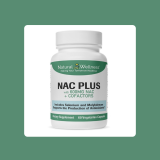

N-Acetyl Cysteine (NAC) has long been celebrated for its antioxidant properties and role in supporting cardiovascular health, detoxification, and chronic disease prevention. However, research expands our understanding of NAC well beyond these traditional benefits. Not only does it support muscle recovery and liver health, but it’s increasingly recognized for its effects on mental health, immune response, and cellular detoxification—particularly when combined with essential cofactors like selenium and molybdenum.
These cofactors are critical for enabling the full therapeutic potential of NAC, especially through its central role in producing and recycling glutathione, the body’s master antioxidant.
What is NAC and Why It Matters
N-Acetyl Cysteine, or NAC for short, is the supplemental form of the amino acid cysteine. For the non-chemists in the room, attaching the acetyl group to the amino acid makes the compound more stable and easily absorbable by our bodies.
Not only does NAC work to scavenge and eliminate muscle-damaging free radicals, but its presence is a precursor to the production of one of our bodies most powerful antioxidants, glutathione. Glutathione is a powerful antioxidant that supports detoxification, protects against cellular damage, and modulates inflammation. According to Neuroscience and Biobehavioral Reviews, “N-acetylcysteine (NAC) is a glutathione precursor with potent antioxidant, pro-neurogenesis and anti-inflammatory properties and a favourable safety profile.“1
NAC Through History
Our awareness of NAC and its properties dates back to the 1960s, but it wasn’t until the late 80s when the scientific and wellness communities began taking notice.
In 1986 when UCLA professor Irwin Zement published findings of NAC’s wellness properties, he wrote that: “New uses include the management of acetaminophen poisoning and the scavenging of free radicals liberated by cancer chemotherapy drugs. The antioxidant effects may be of prophylactic value in lungs at risk from smoking, pollution, and infection. Other uses proposed for NAC include the therapy of connective tissue diseases and its use as a component in life extension diets.”
Its positive effects would appear numerous, and Zement knew he was onto something. And he was right; in the following decades various clinical trials and studies would prove NAC’s health benefits undeniable.
Cut to present day and NAC is being used to reduce exercised induced oxidative-stress, aid muscle recovery, promote liver and kidney health, and as prevention and relief against a myriad of other illnesses.
NAC and other antioxidants are also necessary to support all normal human metabolic functions and to protect us from diseases such as:
- Heart Disease
- Cancer
- Arthritis
- Lung Disease
- Fibromyalgia
- Diabetes
- Neurodegenerative Disorders (Parkinson’s, Alzheimer’s)
- Autoimmune Diseases
- Macular Degeneration
The Critical Role of Selenium and Molybdenum
While NAC is powerful on its own, its efficacy is significantly enhanced when paired with selenium and molybdenum:
- Selenium is a key component of the enzyme glutathione peroxidase, which uses glutathione to neutralize harmful peroxides. Without adequate selenium, this antioxidant system falters.2
- Molybdenum is essential for enzymes that detoxify sulfites and aldehydes—byproducts of both NAC metabolism and environmental exposure. It also helps regulate the sulfur balance in the body, which is crucial when supplementing with NAC.3
Together, these cofactors ensure that NAC can be safely and effectively utilized by the body.
Benefits of NAC for Fitness and Muscle Recovery
While once thought of primarily for its detoxifying capabilities, NAC is gaining traction in the fitness world for its role in reducing muscle fatigue and enhancing recovery:
Enhanced Recovery
NAC helps buffer oxidative stress from intense exercise. It supports glutathione production directly in muscle cells, helping to reduce soreness and speed recovery.
Improved Endurance
By scavenging free radicals, NAC preserves mitochondrial function and electrolyte balance, improving stamina during high-intensity workouts.
Metabolic Support
Although early studies suggested NAC might aid in fat loss, more recent evidence emphasizes its role in supporting metabolic function and mitochondrial health rather than directly reducing body fat.
A 2018 study in the Journal of Applied Physiology showed that NAC enhanced mitochondrial efficiency and reduced fatigue in skeletal muscles of mice.4
Mental Health and Neurological Support
Perhaps the most exciting recent developments in NAC research are in the field of psychiatry and neurology:
Depression and Bipolar Disorder
NAC has shown promise in improving mood and reducing depressive symptoms.
OCD and Addiction
NAC modulates glutamate, a neurotransmitter involved in compulsive behaviors and reward pathways.
Neurodegenerative Diseases
NAC may help mitigate the oxidative stress implicated in conditions like Alzheimer’s and Parkinson’s.
A 2015 review in Journal of Clinical Psychopharmacology reported significant symptom improvements in patients with OCD, bipolar disorder, and schizophrenia who used NAC as an adjunct therapy.5
Liver and Kidney Protection
NAC remains one of the most studied and validated supplements for liver support:
Acetaminophen Poisoning
NAC the gold-standard treatment for acetaminophen poisoning.
NAFLD
It improves markers in non-alcoholic fatty liver disease (NAFLD). A 2020 published study analysis highlights NAC’s ability to reduce liver fat accumulation and inflammation by modulating key molecular pathways and lowering oxidative stress markers. Preclinical findings strongly suggest NAC’s potential to improve liver function and halt the progression to more severe liver injury like NASH.6
Kidney Protection
It protects kidneys from damage due to contrast agents, medications, and environmental toxins.
NAC for Respiratory Support and Immunity
As a mucolytic agent, NAC has been shown to thin mucus and improve lung function. Its relevance has grown in light of COVID-19:
- COPD and Chronic Bronchitis: NAC helps break down mucus, reduce inflammation, and improve breathing.
- Viral Infections: Research during the COVID-19 pandemic highlighted NAC’s ability to modulate inflammation and oxidative damage in the lungs.
A 2020 review in Therapeutics and Clinical Risk Management supported NAC as a potential adjunct therapy for viral respiratory infections.7
Safe Dosage and Usage Guidelines
Typical NAC supplementation ranges from 600 to 1,800 mg per day, depending on the condition being addressed. Higher doses may be used short-term under medical supervision.
- Always pair NAC with adequate selenium (100–200 mcg) and molybdenum (75–150 mcg) for optimal safety and efficacy.² ³
- Those with sulfur sensitivities or impaired sulfur metabolism should consult a healthcare provider.⁴sup
The FDA reversed its initial restriction on NAC in 2022, reaffirming its safety profile when used appropriately.8
Bottom Line
It’s clear that NAC has a good track record not only within the wellness and athletic community but, more importantly, the scientific and medical community. When taken with the necessary cofactors selenium and molybdenum, NAC’s benefits are significantly amplified—from mental health to muscle recovery, liver protection, and immune resilience.
A wide variety of clinical trials and studies have been conducted purporting its benefits and they are undeniable.
It’s inexpensive and easily accessible.
Whether you are active or sedentary, healthy or managing chronic illness, NAC is a powerful tool for enhancing resilience at the cellular level that can benefit you.




